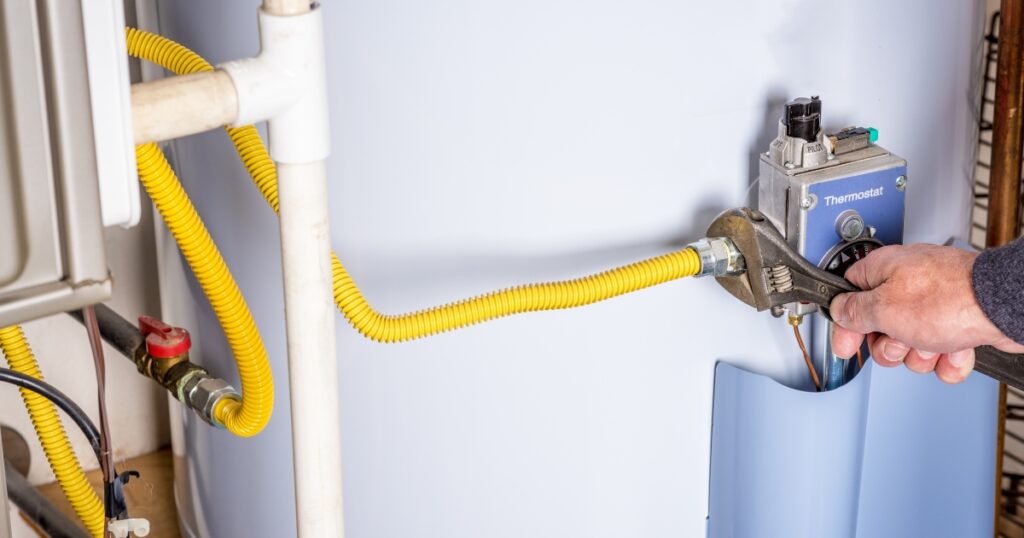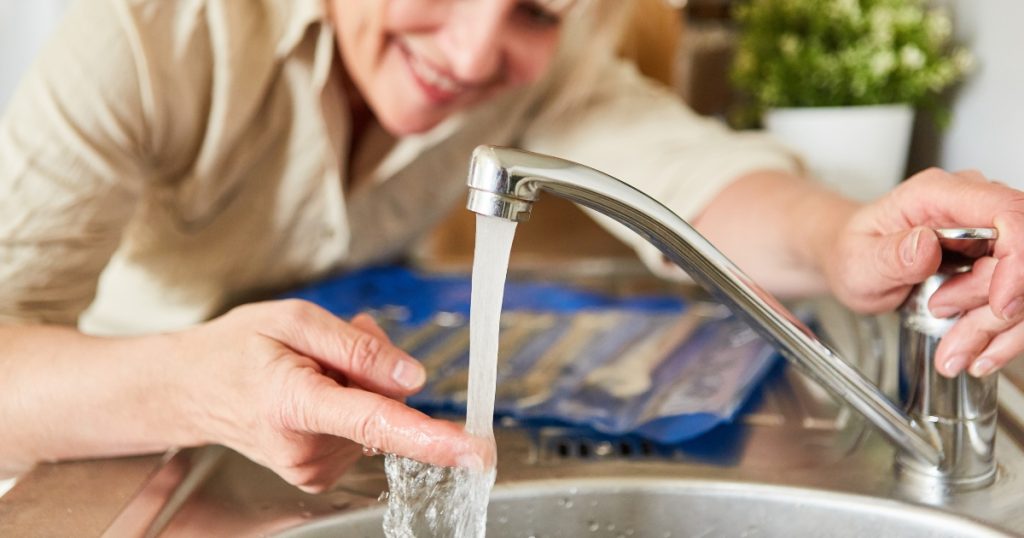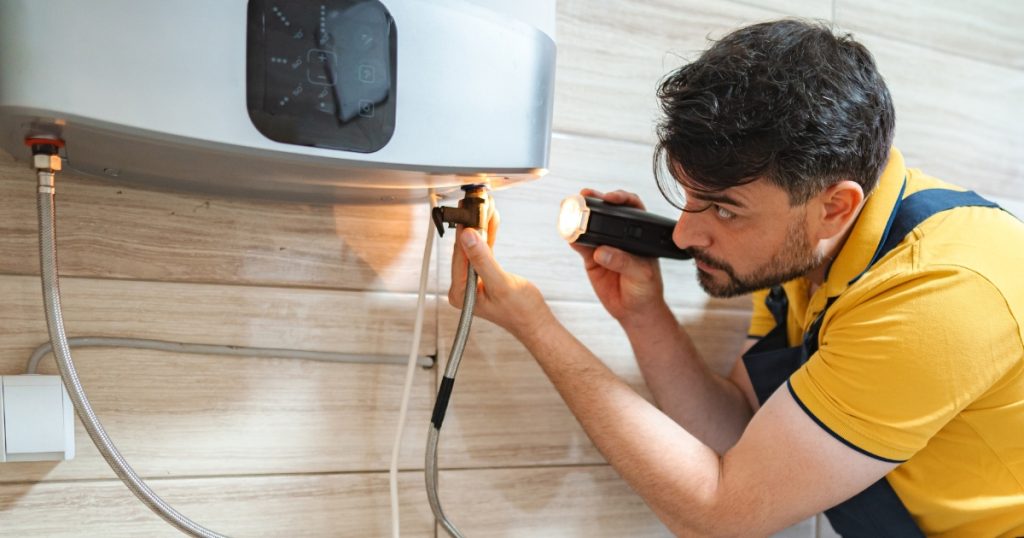Has your gas hot water system been playing up? We’ve all weathered that bone-chilling moment when the shower abruptly decides it’s going cold. No worries, a couple of safety-wise words can come to the rescue: Keeping on top of regular maintenance and having your head switched on about possible hazards can make a world of difference in keeping your home as safe as houses.
In this blog post, we’ll navigate you through some crucial safety checks for your gas hot water system; ready to become a bit of a whiz at looking after your own castle?
Key Takeaways
- Keep flammable materials away from your gas hot water system to prevent fire hazards.
- Schedule regular maintenance with a licensed gasfitter to ensure the safe and efficient operation of your system.
- Be cautious of gas leaks and immediately leave the area if you smell gas. Contact your local gas provider or emergency services for assistance.
- Always handle hot water with caution, wear protective gear, and follow the safety guidelines provided in the instruction manual for your specific system model.
The Importance of Safety in Gas Hot Water Systems
Safety is paramount when it comes to gas hot water systems, and there are several precautions that should be taken to ensure the safe operation and maintenance of these systems.
Avoid using flammable materials near the system
Keeping your gas hot water system clear of flammable materials is a crucial step in maintaining safety at home. Items such as gasoline containers, paint cans or thinners and paper products can pose significant danger if stored too close to the unit.
A single spark could create a dangerous fire hazard that risks lives and property damage. For this reason, we stress regular checks to ensure such items are kept well away from the system’s vicinity.
Despite how safe and efficient gas hot water systems may be when treated correctly, it only takes negligence of this simple precautionary measure for things to go wrong quickly.
Regular maintenance by a licensed gasfitter
Regular maintenance by a licensed gasfitter is essential to ensure the safe and efficient operation of your gas hot water system. A professional gasfitter has the knowledge and expertise to inspect and service your system regularly, which helps identify any potential safety issues before they become major problems.
They will check for leaks, clean or replace filters, test safety devices, and make sure everything is in proper working order. By scheduling regular maintenance with a licensed gasfitter every two years or as recommended by the manufacturer, you can have peace of mind knowing that your gas hot water system is operating safely and effectively.
Keeping up with regular maintenance not only ensures the safety of your home but also extends the lifespan of your system. Gas hot water systems are complex appliances that require specialised care, so it’s important to leave this task in the hands of professionals who understand how these systems work.
Be cautious of gas leaks
Gas leaks can be extremely dangerous, so it’s important to always be cautious. Remember that natural gas is odourless, but a distinct smell (similar to rotten eggs) is added to help detect leaks.
If you detect this smell, leave the area immediately and avoid using lights or phones that could cause sparks. It’s also essential to regularly inspect your gas hot water system for any physical damage or signs of leakage. Taking these precautions will help ensure the safety of your home and family.

Warning Signs of a Faulty Gas Hot Water System
- If you smell gas near your hot water system, it’s a major warning sign of a potential problem.
- When dealing with a gas leak, do not use lights or phones as they can create sparks that could ignite the gas.
- Physical damage to the system such as rust or corrosion should also be taken seriously and addressed promptly by a professional.
Smell for gas
If you ever smell gas near your gas hot water system, it’s crucial to take immediate action. Gas leaks can be extremely dangerous as natural gas is odourless and colourless. To check for a gas leak, try sniffing around the system for a distinct “rotten egg” odour.
If you detect this smell, it’s essential to evacuate the area and avoid using any lights or phones that could create a spark. Remember to contact your local gas provider or emergency services right away to address the issue safely.
Do not use lights or phones
Using lights or phones near a gas hot water system can pose serious safety risks. Gas leaks are a potential hazard, as natural gas is odourless and can go undetected. Using lights or phones in the vicinity of a gas leak can ignite the gas, leading to explosions or fires.
It is crucial to prioritise safety and avoid any potential sources of ignition when dealing with a faulty gas hot water system. Instead, focus on taking necessary precautions and following proper safety guidelines to ensure your well-being and protect your home from any harm that could arise from using lights or phones near the system.
Look for physical damage
Inspecting your gas hot water system for physical damage is an important safety precaution. Regularly checking for signs of wear and tear, such as cracks, rust, or leaks, can help prevent potential hazards.
If you notice any physical damage to your system, it is crucial to contact a licensed gasfitter immediately for repair or replacement. Ignoring physical damage can lead to more serious issues down the line and put you at risk of gas leaks or other dangers.
Stay proactive in maintaining the safety of your gas hot water system by conducting regular visual inspections for any signs of physical damage.
Safety Tips for Operating a Gas Hot Water System
Always use caution when handling hot water. Keep flammable materials away from the system and do not leave them unattended. Read on to learn more about how to safely operate a gas-hot water system.
Always use caution when handling hot water
When handling hot water from a gas hot water system, it is important to always use caution. Hot water can cause burns and scalding if not handled properly. To protect yourself, make sure to wear gloves and long pants when working with hot water.
Additionally, be mindful of the temperature settings on your system to avoid excessively hot water that could cause injuries. Remember to follow the safety guidelines provided in the instruction manual for your specific gas hot water system model.
By practising caution when handling hot water, you can ensure your safety while using your gas hot water system.
Keep flammable materials away from the system
To ensure the safety of your gas hot water system, it is crucial to keep flammable materials far away from it. Gas hot water systems can be easily ignited by items such as gasoline containers, paint cans, and paper products.
These flammable materials should never be stored or used near the system. By keeping a safe distance between the gas hot water system and any potential fire hazards, you greatly reduce the risk of accidents or even explosions.
Make sure to store these materials in a separate location to maintain a safe environment for your gas hot water system.
Do not leave the system unattended
Always remember to never leave your gas hot water system unattended. This is crucial for the safety of you and your home. Unattended systems can pose a serious risk, including potential gas leaks or overheating.
Make it a habit to stay near the system whenever it’s in use, and if you need to step away briefly, be sure to turn it off first. By taking this simple precaution, you can avoid any potential accidents or damage caused by an unattended gas hot water system.
Replacing Old Gas Hot Water Systems
When it comes to replacing old gas hot water systems, it’s crucial to hire a licensed gasfitter for the installation process.
Reasons to replace an old system
Replacing an old gas hot water system is necessary for various reasons.

Firstly, older systems tend to be less energy-efficient, resulting in higher utility bills. By upgrading to a newer model, you can enjoy improved efficiency and potentially save on your energy costs.
Secondly, older systems may be prone to frequent breakdowns and repairs, causing inconvenience and additional expenses. A new system will provide greater reliability and peace of mind.
Lastly, safety is a crucial consideration when it comes to gas appliances. Older systems may have outdated safety features or potential leaks that can pose risks to your household.
Hire a licensed gasfitter for installation
To ensure the safe and proper installation of your gas hot water system, it is essential to hire a licensed gasfitter. Installing a gas hot water system can be complex, and it requires specific knowledge and expertise.
A licensed professional will have the necessary training and experience to handle the installation process correctly, minimising the risk of any safety hazards. They will also ensure that all connections are secure and in compliance with safety regulations.
By entrusting this task to an expert, you can have peace of mind knowing that your gas hot water system is installed safely and efficiently.
It’s important to note that attempting to install a gas hot water system yourself or hiring an unqualified person may result in serious consequences, such as leaks or improper functioning of the system.
Proper disposal of the old system
When it comes to replacing an old gas hot water system, proper disposal is crucial. Old systems can contain hazardous materials and should not be thrown in regular trash bins. Instead, they should be taken to a designated recycling centre or disposed of by a licensed professional.
This ensures that any harmful substances are handled safely and does our part in protecting the environment. So, when it’s time for a new system, make sure to take the necessary steps for proper disposal of the old one!
Extra Precautions for Unflued and Open-Flued Gas Heaters
When using unflued and open-flued gas heaters, it’s important to take extra precautions. These types of heaters can release harmful gases like carbon monoxide into the air, so it’s crucial to ensure proper ventilation and avoid using exhaust fans while the heater is on.
Additionally, using a carbon monoxide alarm in the room where the heater is located can provide an added layer of safety and peace of mind.
Avoid using exhaust fans while the heater is on
Using exhaust fans while the gas heater is on can create a dangerous situation by pulling harmful gases, such as carbon monoxide, back into your home. These gases can be colourless and odourless, making them difficult to detect without proper ventilation.
To prevent this risk, it’s important to refrain from using exhaust fans when your gas heater is in operation. This will help ensure that any potentially harmful gases are safely vented outside of your home and not circulated back inside where they can pose a threat to your and your family’s health and safety.
Taking this simple precautionary measure can go a long way in protecting yourself and maintaining a safe environment when using a gas heater.
Use a carbon monoxide alarm
We highly recommend using a carbon monoxide alarm in your home if you have an unflued or open-flued gas heater. Carbon monoxide is a colourless and odourless gas that can be released during the combustion process of these types of heaters.
It can pose serious health risks, including carbon monoxide poisoning, which can be fatal. Installing a carbon monoxide alarm will help detect any presence of this harmful gas and alert you to potential dangers.
Make sure to place the alarm in areas where it can easily detect any emissions from the heater, such as near bedrooms or living areas. Regularly test and replace the batteries in your carbon monoxide alarm to ensure its effectiveness in keeping your home safe from this invisible threat.
Ensure proper ventilation
Proper ventilation is crucial for the safe operation of a gas-hot water system. Adequate airflow helps to prevent the buildup of harmful gases like carbon monoxide, which can be odourless and pose serious health risks.
It is important to ensure that there are no obstructions around the system’s vents or flue, as this can impede proper ventilation. Regularly inspecting and cleaning the vents will help to maintain optimal airflow and keep you and your family safe from potential hazards.
Safety Precautions
In conclusion, prioritising safety precautions is crucial when it comes to gas hot water system repair. By avoiding flammable materials, regularly maintaining the system, and being cautious of gas leaks, homeowners can ensure a safe operating environment.
Remember to also watch for warning signs of faults and follow proper safety tips while using the system. Taking these measures will help prevent accidents and maintain the efficiency of your gas hot water system.





